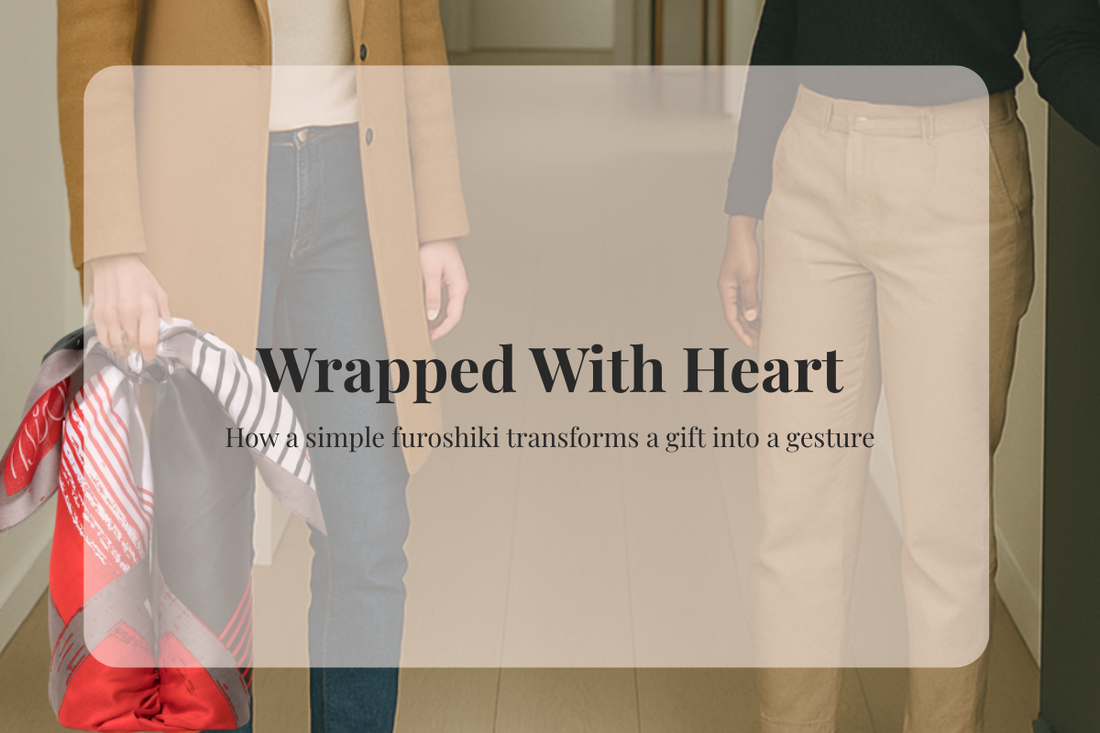
Wrapped with Care: A Japanese Way to Share the Heart
It was a quiet weekend evening, and I was on my way to a colleague’s home for a casual gathering.
In my hands were two bottles of wine—one red, one white—carefully bundled together in a single piece of cloth known in Japan as a furoshiki. This particular method, called “bin nihon tsutsumi” (two-bottle wrap), is both practical and elegant, offering stability and a refined touch to the gift.
In Japan, to wrap is to show respect
In many parts of the world, gift wrapping is about hiding a surprise or making a present look festive.
In Japan, however, wrapping itself is an act of thoughtfulness—a quiet gesture of respect.
To take time to fold and tie a furoshiki around a gift says, I cared enough to prepare this for you. It’s a cultural expression of attentiveness, a subtle but meaningful form of hospitality.
This kind of mindfulness has even drawn attention from international scholars, who see in Japanese customs what they call “unconscious hospitality”—a deeply embedded way of caring for others that goes beyond formal service.¹
The charm of furoshiki lies beyond function
Furoshiki are versatile, yes—they can be reused as scarves, eco-friendly shopping bags, or even home décor.
But their true charm lies not in their practicality, but in the impression they leave.
That evening, when I handed over the wrapped wine, my colleague paused, surprised.
“This is beautiful—what is it?” she asked with a smile. That moment, that genuine spark of joy, was a reminder: a gift is remembered not just for what it is, but for how it is given.
Furoshiki: a cultural fabric with quiet philosophy
There are many beautiful wrapping traditions around the world—bojagi in Korea, reusable fabric gift bags in the West.
But the Japanese approach to wrapping involves more than design or function. It’s about creating a moment of pause, a respectful “space” between giver and receiver.
The folds, the choice of colors, the balance of the knots—all of it reflects an intention to maintain harmony and connection.
In that way, furoshiki are not just cloths; they are tools for cultivating relationship.
This quiet philosophy continues to resonate in modern life. In an increasingly fast-paced world, taking the time to wrap something with care can be a way of reclaiming presence and gratitude.
To choose furoshiki is to choose meaning
So the next time you bring a gift—whether for a dinner party, a holiday, or just because—consider reaching for a furoshiki.
Not only will it reflect a cultural elegance, but it also offers a gentler, more sustainable way to express thoughtfulness.
And who knows? Perhaps the person who receives it will one day use that same cloth to wrap something for someone else.
And so the care continues—quietly, beautifully, endlessly.
References
-
Kumagai, Eiko. Hospitality as a Cultural Practice: Unconscious Hospitality in Japanese Daily Life. Kansai Gaidai University Research Bulletin, Vol. 121. Link to source
